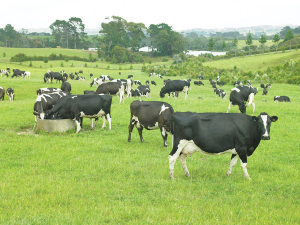Wired for Science: Understanding the feeding habits of mealybug
Fussy children might be frustrating, but fussy mealybugs could help protect the New Zealand wine industry from grapevine leafroll-associated virus 3.
 The research also showed that the low MUNBV cows also yielded an increase in milk protein percentage.
The research also showed that the low MUNBV cows also yielded an increase in milk protein percentage.
New research from Lincoln University has revealed that the genetic disposition of dairy cows could significantly reduce nitrate leaching.
Lincoln University’s Pastoral Livestock Production Lab found that grazing dairy cows with low milk urea nitrogen breeding values (MUNBV) have a 28% reduction in the urinary urea nitrogen loading rate per urine patch than cows with higher MUNBVs.
The lowest MUNBV animals in the study excreted 165.3 g less urinary urea nitrogen per day than the highest MUNBV animals.
As an example, at four cows per hectare, this difference equates to 241kg urinary urea less deposited onto pasture, resulting in 41kg less nitrate leached per hectare per year.
The research, completed by PhD student Cameron Marshall, also showed that the low MUNBV cows also yielded an increase in milk protein percentage.
Lincoln’s Professor of Livestock Production Pablo Gregorini says the findings are very significant for farmers and the entire agriculture sector.
“Cameron’s work shows that the cows themselves are an important tool in helping to cut nitrate leaching and nitrous oxide emissions, and in helping farmers meet their regulatory reductions. To be able to do this and increase milk protein at the same time is a huge win:win for the sector.
“Most farmers’ herds will naturally comprise a mixture of low MUNBV cows and higher MUNBV cows, with the trait being identified through testing the milk. Simply identifying the animals with low MUNBVs will enable famers to breed from their existing stock and change the makeup of their herd over time.”
Research into the differences between low MUNBV and higher MUNBV animals will continue, with Cameron Marshall studying the data to identify where further benefit-yielding research should be directed.
The World Wide Sires National All Day Breeds Best Youth Camp Best All Rounder plaudit has become family affair, with 2026 Paramount Cup winner Holly Williams following in her sister Zara's footsteps.
DairyNZ is giving New Zealand farmers a unique opportunity to gain hands-on governance and leadership experience within the dairy sector.
Herd improvement company LIC has posted a 5.2% lift in half-year revenue, thanks to increasing demand for genetics.
According to the latest Fresh Produce Trend Report from United Fresh, 2026 will be a year where fruit and vegetables are shaped by cost pressures, rapid digital adoption, and a renewed focus on wellbeing at home.
The Roar is a highlight of the game hunting calendar in New Zealand, with thousands of hunters set to head for the hills to hunt male stags during March and April.
OPINION: The past few weeks have been tough on farms across the North Island: floods and storms have caused damage and disruption to families and businesses.
OPINION: Fonterra may be on the verge of selling its consumer business in New Zealand, but the co-operative is not…
OPINION: What does the birth rate in China have to do with stock trading? Just ask a2 Milk Company.